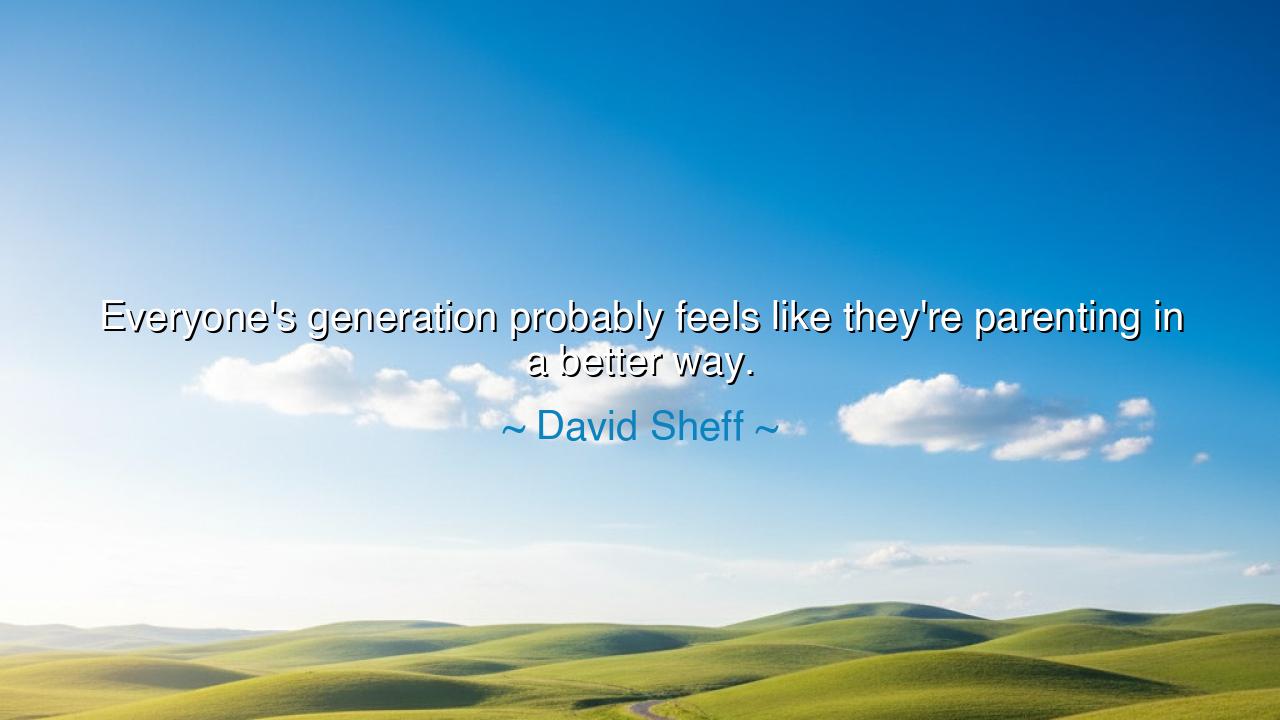
Everyone's generation probably feels like they're parenting in a






The words of David Sheff—“Everyone’s generation probably feels like they’re parenting in a better way.”—reveal one of the oldest truths beneath the sun: that each age believes it has surpassed the wisdom, or corrected the errors, of the age before it. What parent does not think, in quiet or in pride, “I will not repeat the mistakes of my parents”? And what child, grown into adulthood, does not look back and whisper, “We know better now”? Thus, Sheff’s observation is not merely about parenting, but about the eternal cycle of human pride and striving.
In the times of the ancients, the elders would look upon the young and say, “They are soft, untested, foolish.” And the young would look upon the elders and say, “They are rigid, blind, out of touch.” This tension has always lived within the family, for it is in the family that generations collide most closely. Parenting, then, becomes both the battlefield and the bridge where these claims of superiority are tested. One age prizes obedience, another prizes freedom. One age raises children with silence and discipline, another with dialogue and tenderness. And each declares, “This way is better.”
Consider the example of the philosopher Aristotle, who himself was shaped by Plato, yet dared to challenge and surpass his teacher. Aristotle’s teachings shaped Alexander the Great, who carried his wisdom to the edges of the known world. Here we see the cycle: the student believes he has found a greater truth, the son believes he has found a better way. And yet, without Plato, there is no Aristotle; without Philip, there is no Alexander. So it is with parenting: each generation is both indebted to and defiant of the one before.
David Sheff’s words also remind us of humility. For while one generation may believe it has advanced beyond its ancestors, time will reveal its own flaws. The parents of today, who scoff at the rigid rules of the past, may themselves be judged tomorrow for their indulgence or overprotection. What they believe to be a better way may one day be seen as folly. Thus, the wheel turns, and wisdom is found not in pride, but in the acknowledgment that all generations parent according to their time, their struggles, and their vision of the future.
The meaning of this truth is both sobering and liberating. It teaches us that no generation holds the perfect key to parenting. Each brings forth both light and shadow. The stern fathers of the past forged resilience, but sometimes left wounds of silence. The gentle parents of the present nurture openness, but may fail to instill strength. Neither is wholly wrong nor wholly right; both are fragments of a greater, unreachable whole. The claim to superiority is an illusion, but the striving itself is noble, for it shows that parents always yearn to do better for their children.
The lesson is clear: honor the wisdom of the past, but do not cling blindly to it; pursue the ideals of the present, but do not believe them flawless. Each parent must walk the narrow path of balance—holding gratitude for their own upbringing, while daring to adapt and evolve. To sneer at the past is arrogance, but to ignore the needs of the present is folly. True wisdom lies in discernment, in learning from both the strengths and the failings of every generation.
Therefore, let your actions be these: seek the counsel of the elders, for their scars carry lessons no book can teach. Embrace the voice of the present, for the world of today is not the world of yesterday. And above all, parent with humility, knowing that you, too, will one day be judged by the eyes of your children’s children. Teach not perfection, but love; not superiority, but wisdom born of listening.
Thus, David Sheff’s words shine like an eternal reminder: every generation believes it is better, but no generation is final. The quest for a “better way” is endless, and in that quest lies the very heart of parenting. For it is not about proving superiority, but about striving—always striving—to raise children with greater love, greater courage, and greater hope than before.






AAdministratorAdministrator
Welcome, honored guests. Please leave a comment, we will respond soon